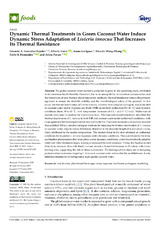Mostrar el registro sencillo del ítem
Dynamic thermal treatments in green coconut water induce dynamic stress adaptation of listeria innocua that increases its thermal resistance
| dc.contributor.author | González-Tejedor, Gerardo A. | |
| dc.contributor.author | Garre, Alberto | |
| dc.contributor.author | Iguaz, Asunción | |
| dc.contributor.author | Wong-Zhang, Ricardo | |
| dc.contributor.author | Fernández, P. | |
| dc.contributor.author | Melo Possas, Arícia Mara | |
| dc.date.accessioned | 2023-11-06T13:47:57Z | |
| dc.date.available | 2023-11-06T13:47:57Z | |
| dc.date.issued | 2023 | |
| dc.identifier.issn | 2304-8158 | |
| dc.identifier.uri | http://hdl.handle.net/10396/26144 | |
| dc.description.abstract | The global coconut water market is projected to grow in the upcoming years, attributed to its numerous health benefits. However, due to its susceptibility to microbial contamination and the limitations of non-thermal decontamination methods, thermal treatments remain the primary approach to ensure the shelf-life stability and the microbiological safety of the product. In this study, the thermal inactivation of Listeria innocua, a Listeria monocytogenes surrogate, was evaluated in coconut water and in tryptone soy broth (TSB) under both isothermal (50–60 °C) and dynamic conditions (from 30 to 60 °C, with temperature increases of 0.5, 1 and 5 °C/min). Mathematical models were used to analyse the inactivation data. The Geeraerd model effectively described the thermal inactivation of L. innocua in both TSB and coconut water under isothermal conditions, with close agreement between experimental data and model fits. Parameter estimates and analysis revealed that acidified TSB is a suitable surrogate medium for studying the thermal inactivation of L. innocua in coconut water, despite minor differences observed in the shoulder length of inactivation curves, likely attributed to the media composition. The models fitted to the data obtained at isothermal conditions fail to predict L. innocua responses under dynamic conditions. This is attributed to the stress acclimation phenomenon that takes place under dynamic conditions, where bacterial cells adapt to initial sub-lethal treatment stages, leading to increased thermal resistance. Fitting the Bigelow model directly to dynamic data with fixed z-values reveals a three-fold increase in D-values with lower heating rates, supporting the role of stress acclimation. The findings of this study aid in designing pasteurization treatments targeting L. innocua in coconut water and enable the establishment of safe, mild heat treatments for refrigerated, high-quality coconut water. | es_ES |
| dc.format.mimetype | application/pdf | es_ES |
| dc.language.iso | eng | es_ES |
| dc.publisher | MDPI | es_ES |
| dc.rights | https://creativecommons.org/licenses/by-nc-nd/4.0/ | es_ES |
| dc.source | Foods, 12(21), 4015 (2023) | es_ES |
| dc.subject | Inactivation | es_ES |
| dc.subject | Plant-based beverages | es_ES |
| dc.subject | Stress response | es_ES |
| dc.subject | Foodborne pathogens | es_ES |
| dc.subject | Modelling | es_ES |
| dc.title | Dynamic thermal treatments in green coconut water induce dynamic stress adaptation of listeria innocua that increases its thermal resistance | es_ES |
| dc.type | info:eu-repo/semantics/article | es_ES |
| dc.relation.publisherversion | https://doi.org/10.3390/foods12214015 | es_ES |
| dc.relation.projectID | Gobierno de España. MCIN/AEI/10.13039/501100011033 | es_ES |
| dc.relation.projectID | Gobierno de España. PID2020-116318RBC32 | es_ES |
| dc.rights.accessRights | info:eu-repo/semantics/openAccess | es_ES |

